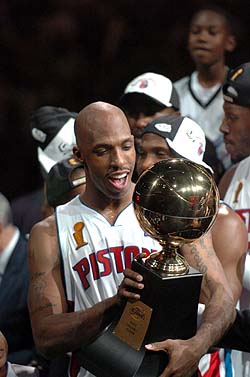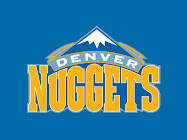Remember that the RTR is NOT simply a rating of how well the teams did in the regular season. Rather, it is a rating system designed to reveal the capability of winning playoff games and series of each team. Several careful and statistically valid adjustments are made to allow the RTR to accurately reflect the known factors that impact winning in the playoffs.
The RTR CAN be roughly used to predict who will win playoff series. However, there are of course many factors not included in the RTR, one of which, injuries, by itself can change the outcome of a series. By far the factor not included in basic RTR that has the biggest impact on whether a series is won or lost is injuries. Therefore, we are developing a new injury adjustment for RTR, which is extensively described below.
A good example of how important injuries are is this year's Dallas-San Antonio series. As you can see below, RTR predicts that the Spurs would most likely defeat the Dallas Mavericks in a playoff series. But Dallas won it, and clearly it was at least substantially, probably almost entirely, and possibly completely due to the injury to Manu Ginobili, one of the best players in the NBA, and absolutely essential on offense. San Antonio was especially hammered by the unavailability of Ginobili, since they were already relatively short on great offensive players to begin with.
A SMALLER BUT STILL SIGNIFICANT FACTOR: COACHING THAT IS MORE SUCCESSFUL IN THE REGULAR SEASON THAN IN THE PLAYOFFS
Most factors not in the RTR other than injuries are believed to have much, much smaller impacts on whether playoffs are won or lost. However, there is one factor that may have an impact greater than small.
Coaching is largely reflected in the RTR, except that there are coaches such as George Karl and Nate McMillan who have track records of seeing their coaching succeed in the regular season much more so than in the playoffs.
In other words, and more broadly, it is believed by us here at Quest that how a team is coached, and what schemes it is using on offense and defense, can have a different impact in the playoffs than it did in the regular season. This would not be picked up by the RTR.
One of the primary objectives of the Quest for the Ring is to identify and explain offensive and defensive strategies that work better in the regular season than they do in the playoffs, and vice versa.
Fortunately for teams with coaches whose coaching works better in the regular season than in the playoffs, the negative impact on RTR of such coaching is believed to be not large, probably in the up to 15 RTR points range. On the other hand though, a 10-15 point hit would be plenty big enough to swing any close series. So such coaching is perhaps not ruinous overall to a team, because it will not automatically cause an upset to that team when it is heavily favored. But it will cost that team plenty of close series, and so that type of coaching will certainly be in the long run ruinous to the objective of going as far as possible in the playoffs.
For complete details regarding how the Real Team Ratings are designed and why they work, see the User Guide.
REAL TEAM RATINGS
NBA 2008-09 REGULAR SEASON FINAL
1 Cleveland Cavaliers 72.55
2 Los Angeles Lakers 64.37
3 Orlando Magic 57.62
4 Boston Celtics 54.40
5 Houston Rockets 25.55
6 Denver Nuggets 16.82
7 Portland Trail Blazers 13.71
8 San Antonio Spurs 12.53
9 Dallas Mavericks -5.17
10 New Orleans Hornets -6.00
11 Utah Jazz -8.77
12 Atlanta Hawks -9.49
13 Miami Heat -23.00
14 Chicago Bulls -24.02
15 Phoenix Suns -24.55
16 Philadelphia 76ers -24.91
17 Charlotte Bobcats -31.82
18 Detroit Pistons -32.00
19 Indiana Pacers -36.72
20 Milwaukee Bucks -38.51
21 New Jersey Nets -46.66
22 New York Knicks -53.90
23 Toronto Raptors -54.52
24 Golden State Warriors -60.88
25 Memphis Grizzlies -70.80
26 Oklahoma City Thunder -78.99
27 Minnesota Timberwolves -85.40
28 Washington Wizards -89.42
29 Los Angeles Clippers -94.43
30 Sacramento Kings -99.70
Congratulations to all NBA teams and all NBA players for a great year. Congratulations to LeBron James and the Cleveland Cavaliers for being the very best and therefore earning the position of highest Real Team Rating for 2008-09. LeBron James also will almost certainly finish with the highest Real Player Rating when those come out in early July. So LeBron has cleaned up here at Quest this year.
EXTENSIVE USER GUIDE EXCERPTS
We are placing about 60% of the extensively revised Real Team Ratings User Guide here, so that when we go over playoff series the rest of the year, and refer to the Real Team Ratings, both the Ratings themselves and detailed explanations of what we are doing to adjust those ratings will be accessible at the same place, right here, by anyone who is interested. For that matter, anyone can use the ratings above and the system below to do series projections themselves, both for actual series and for hypothetical series that never took place for one reason or another. Moreover, any user can change specific factors we use, even if they are using the system as a whole.
So we will now reprint many sections of the extensively updated User Guide for Real Team Ratings. The sections dealing with base RTR are NOT shown below, most of which are unchanged from a few months ago. However, there actually was a revision, a relatively small one but not a very small one, to the base RTR calculation, to the wins and losses against playoff teams specifically, which is described at the complete User Guide. The complete User Guide is here.
ADJUSTING BASE RTR FOR FACTORS NOT INCLUDED IN BASE RTR THAT CAN BE MAJOR FOR DETERMINING WHO WINS PLAYOFF SERIES
Of all the popular American sports Leagues, the NBA is the one where the better team is most likely to avoid being upset in the playoffs. Therefore, the RTR system can be used to gain knowledge of which team is most likely to win playoff series. It can also be used to determine whether how good various players played led to an upset or not, and to get a general idea of how much better or worse than expected teams played in playoff series.
In order to do these things, however, it is necessary to modify base RTR for at least two factors that can not be directly embedded in it: home court advantage and players unavailable or playing badly due to injuries.
Even just to start with, due to a small amount of unavoidable statistical error remaining in the base RTR, there has to be a 7-12 points difference between teams before you can start to have any big confidence that one team will defeat another in the playoffs. More importantly, there are also factors unknown until close to or exactly when the series is actually being played, especially what the injury situation for each team is.
Another factor that becomes a big one when two teams with very similar ratings are playing is home court advantage. Home court advantage is estimated to be worth between 5 and 7 points.
Even if it were not for the injury wild card factor, use of RTR to predict playoff series prior to March 1 would not be very useful, due to the need for a fairly high percentage of the season to be over before the projections in base RTR are statistically meaningful, and due to the fact that the ratings are not relative to time, but rather expand with time.
MAJOR FACTORS DETERMINING WHO WINS PLAYOFF SERIES NOT BUILT IN TO THE BASIC RTR
1.HOME COURT ADVANTAGE
The home court advantage in RTR terms is believed to be 5 to 7 points
2. PLAYERS UNAVAILABLE (OR PLAYING POORLY) DUE TO INJURES
The impact relative to RTR is believed to be mathematically anything from almost 0 to 100 points for each injured and unavailable player who played during the regular season, depending mostly on how good the injured player is and depending on to what extent other players are able to step up and replace the injured player or players. Although the mathematical range of impact is 0 to 100, the realistically true and common relevant range covering the loss of starters and key reserves, is about 10 to 60 RTR points.
Players who were injured the entire season are irrelevant, except of course they are relevant in the hypothetical sense of how the season could have been different. Players who were injured relatively early in the regular season, in November or December, are only slightly relevant, and the loss of them would be a much smaller number of reduced RTR points than when the loss is later. Players who were injured late in the season, from mid-February to mid-April, have the most relevancy to whether playoff series can be won or lost, and the RTR reduction for them is much higher.
INJURY ADJUSTMENT TO RTR DIFFERENTIALS (DEVELOPMENTAL BUT HAS PASSED INITAL REVIEWS)
This adjustment is under development and review. However, it has passed initial approvals, which means it is very likely to be officially adopted in the near future.
The base or starting point is the quality of the player, as shown by the Real Player Ratings including the defending adjustment.
BASE FOR THE DOWNWARD ADJUSTMENT TO RTR DUE TO INJURY/UNAVAILABLILTY OF PLAYERS
Almost Perfect Player: 125
Historical Superstar: 113
Superstar: 98
Star: 81
Outstanding/Solid Starter: 64
Major Role Player: 49
Role Player: 36
Minor Role Player: 25
Very Minor Role Player: 16
Poor Player: 9
Very Poor Player: 4
Extremely Poor Player: 1
Remember, the base is just the hypothetical maximum possible impact, and is not a relevant real world outlook by itself. The RTR impact and the real world impact of the loss is determined by many variables, the most important of which are when the player was lost, and to what extent the other players can make up for the loss of that player.
DOWNWARD ADJUSTMENT FACTORS TO THE RTR INJURY ADJUSTMENT BASE
FACTOR FOR TIME IN THE SEASON WHEN THE PLAYER WAS LOST
November .1
December .25
January .45
February .70
March .95
April 1.0
FACTOR FOR TO WHAT EXTENT OTHER PLAYERS CAN MAKE UP FOR THE UNAVAILABLE PLAYER
We currently have to describe this adjustment generically:
(1)The player or players getting the lost minutes are close in quality (no more than one Real Player Rating category lower) and also close in terms of basketball position played, to the lost player: .4 to .6
(2)The player or players getting the lost minutes are close in quality, but are not close in terms of the position(s) played: .55 to .75
(3)The player or players getting the lost minutes are not close in quality, but are close in terms of the position played: .7 to .9
FACTOR FOR IMPORTANCE OF PLAYER TO THE TEAM (SHOWN BY MINUTES PER GAME)
32 mpg and more: 1.0
28 to 31.1: .9
24 to 27.9: .8
20 to 23.9: .7
16 to 19.9: .6
12 to 15.9: .5
8 to 11.9: .4
4 to 7.9: .3
Less than 4: .2
AN EXAMPLE OF HOW BASE RTR IS ADJUSTED FOR INJURIES: THE 2009 BOSTON CELTICS
Ok, now lets consider an example to see how all of this works. We have this year Kevin Garnett, one of the very best players in the NBA, not available to the Celtics due to injury. Garnett is in the almost perfect player range, so you start with 125 points as the unadjusted impact of the Garnett loss to the Celtics' Real Team Rating.
Now we need to breakdown that 125 gross number. First, we need the when the player was lost factor. Although Garnett came back for a few games in March, he was essentially lost for the season in February, so the factor to use is .70.
Next we need the stepping up of other players factor. Rajon Rondo has responded by being even better than he was in the regular season, which already was at the superstar level. And Rondo overall is playing as good as Garnett would be if he were playing, at the almost perfect level to be exact. So this turn of events would put the Celtics in the (2) situation above, so the factor to use would be between .55 to .75. Based on how extremely well Rondo is playing, and based on the overall resiliency of the Celtics, we will use .60 as the factor.
The third and final factor to use on the gross injury base RTR adjustment is how important the player is to the team, as shown by minutes per game. Garnett was about 31 minutes a game this season, so the factor to use is .9.
Now we can calculate by how many points we should downgrade the Celtics' RTR due to the loss of Kevin Garnett:
125 *.60 *.70 *.90 = 47.3
LEON POWE
Now we need to figure out how much the Celtics have lost due to Leon Powe not being available. Because the Celtics are also without Leon Powe, a very underrated 17 minutes a game forward, whose 2008-09 quality level was major role player.
Since he is a major role player, we start with 49 points. He was lost at the very end of the season, so the when lost factor is 1.0. Due to the simultaneous loss of Garnett and Powe, the Celtics are severly depleted upfront, which means you can positionally replace Garnett but not both Garnett and Powe at the same time, which in turn translates into a factor of about .75 for the to what extent other players can replace Powe factor. Finally, Powe played about 17 minutes a game this season, which means you should use a factor of .6 for importance of the player to the team.
Now we can calculate about how many RTR points the Celtics have lost due to Leon Powe not being available:
49 * 1.0 * .75 * .60 = 22.1
The two losses cost the Celtics roughly 47.3 + 22.1 = 69.4 points.
The Celtics' 2008-09 RTR unadjusted for injuries was 54.4. The Chicago Bulls' RTR was -24.02. So the difference between the two teams started out as 78.42. But the loss of Garnett and Powe cost the Celtics roughly 69.4 RTR points, leaving them with only a measly 9 points advantage over the Bulls, or 15 points once you add on the 6 points for home court advantage.
According to the Guidelines for Interpreting Differences in Real Team Ratings (which is reprinted from the overall User Guide below) a 15 points difference means there was somewhere between a 72% and an 80% that the Celtics were going to win the series.
So in real life, the series played out exactly as the RTR predicted that it would, at least once you have adjusted the RTR for players not available!
So what has to be done to figure out the real differences between any two playoff teams is to start with RTR, and then use the under development but destined to become officially approved Injury Adjustments. So we will have RTR-IA to use to predict playoff series, and to judge whether a series has been an upset or not, and also to judge just how heroic players such as Rajon Rondo are. (Note: always remember to add in about 6 points for the home court advantage, too.)
Bottom line for the Celtics: Rajon Rondo has been out there making up for both Kevin Garnett and Leon Powe. He has been a hero, not only for that, but also because he was already a superstar in the regular season, and then he had to get even better than being a superstar.
How would you like someone to come up to you and say to you: "You are a superstar, but that is not good enouogh right now. Now you have to be better than a superstar, you have to be almost perfect." You might be thinking to yourself: "Yeah right, I'm going to be able to suddenly be even better than I already am. I'll try, but I doubt it's going to happen; I'm not a miracle worker".
Whereas Rondo said: "No problem, I'm down with that." And then he proceeded to go out there and be almost perfect, as if that is as easy as waking up in the morning.
So Rajon Rondo is no doubt one of the heroes of the 2009 playoffs. And he has a very good chance of being the first ever Real Playoffs MVP here at Quest, which will be an honor given out to the player who did the most to help his team, regardless of exactly how many games and series the team won.
It's a good thing he already has a ring, because if he didn't fully earn it last year, he sure as hell earned one this year.
But the Celtics will need a miracle to defeat the Magic despite this.
GUIDE TO INTERPRETATION OF DIFFERENCES BETWEEN TEAMS' REAL TEAM RATINGS
In the numeric interpretaton guide that follows, the word "roughly" is repeatedly used in front of the probability numbers, as a reminder about the small amount of unavoidable statistical error, and to emphasize that unknown factors, especially injuries, will in some cases result in substantially different actual probabilities.
The probability percentages are based on the historical results in the NBA:
REMEMBER:
In order to realistically compare teams using RTR, particularly if your objective is to know who is most likely to win playoff series, you MUST add 5 to 7 points to the RTR of the team that has home court advantage (HCA), and you MUST use the Injury Adjustment (IA) for all injured players on all teams evaluated. The injury adjustment is under development, is in beta currently, and is described extensively above. In other words, for any and all teams being evaluated, you MUST use RTR + HCA + IA
The following guidelines assume that the HCA and all injury adjustments have been correctly done.
DIFFERENCE IN RATINGS IS BETWEEN 0 AND 5.9
The series is a complete toss-up, when statistical error is considered. There is a strong possibility of a 7 game series. The higher team has a 50% to 57% chance of winning, depending on what exactly the difference is. These probabilities are too low for anyone to have any confidence in using adjusted RTR to say who will win. All series of this type are decided quite simply by who plays better, by who coaches better, or both.
DIFFERENCE IN RATINGS IS BETWEEN 6.0 AND 11.9
The series can easily go either way, although the higher team has a slight edge, and has between a 57% to 66% chance of winning, depending on where in the range the difference is. There is a very substantial chance of a 7-game series. If the lower team wins, it is nothing more than a very minor upset. Either slight differences in the quality of coaching, certain players playing a little better or a little worse than they did in the regular season, or both, could be responsible for an upset at this level.
DIFFERENCE IN RATINGS IS BETWEEN 12.0 AND 17.9
The series can go either way, and this type of difference gives a substantial chance for a 7-game series. But the higher team has a clear edge. The higher team has between a 66% and a 76% probability of winning, depending on where in the range the difference is. If the lower team wins, it is an upset, though just a small upset. Either slight differences in the quality of coaching, certain players playing a little better or a little worse than they did in the regular season, or both, could be responsible for an upset at this level.
DIFFERENCE IN RATINGS IS BETWEEN 18.0 AND 23.9
The higher team has roughly between a 76% to 84% probability of winning, depending on where in the range the difference is. There is still a chance, but a relatively small one, for a 7-game series. If the lower team wins, it is clearly an upset, though generally not a major upset. Either coaches, certain players, or both could be responsible for an upset at this level.
DIFFERENCE IN RATINGS IS BETWEEN 24.0 AND 29.9
The higher team has roughly between an 84% to a 91% probability of winning, depending on where in the range the difference is. In this kind of series, often the only way the lower team can win the series is by extending the series out to 7 games and then somehow winning the 7th game, thus taking the series 4 games to 3. However, it is not uncommon, assuming there is an upset in this type of series, for the lower team to so severly disrupt the favored team that the lower team upsets the higher, favored team 4 games to 2. Whichever way it does it, if the lower team does win coming in down by this amount, it should be considered a major upset. In many such cases, the coaching would have to be very wrong and/or negligent.
DIFFERENCE IN RATINGS IS BETWEEN 30.0 AND 35.9
The higher team has roughly between a 91% and a 95.5% probability of winning. depending on where in the range the difference is. In this kind of series, often the only way the lower team can win the series is by taking the series 7 games and winning the 7th game, thus taking the series 4 games to 3. However, there have been a tiny number of series where a team with this amount of a RTR deficit has won the series by so severly disrupting the favored team that it is able to win the series 4 games to 2. In the vast majority of such cases, the coaching for the higher team was severely wrong and/or negligent. Whether accomplished in 6 games or 7, the lower team winning despite being this far behind in RTR is extremely rare, and would be considered a very shocking, historical upset.
DIFFERENCE IN RATINGS IS BETWEEN 36.0 AND 41.9
The higher team has roughly between a 95.5% and a 98% probability of winning, depending on where in the range the difference is. Obviously, an upset would be extremely rare, shocking, and historical. It would in most cases be caused substantially by incompetent and/or severely negligent coaching. With this amount of difference, any upset would almost certainly have to be with the series going all seven games.
DIFFERENCE IN RATINGS IS 42.0 AND 47.9
The higher team has a roughly between a 98% and a 99.5% probability of winning the series. Obviously, an upset would be extremely rare, shocking, and historical. It would in most cases be caused substantially by incompetent and/or severely negligent coaching. With this amount of difference, any upset would almost certainly have to be with the series going all seven games.
DEFFERENCE IN RATINGS IS 48.0 OR MORE
It is close to a 100% certainty that the higher team will win the series. Obviously, an upset would be extremely rare, shocking, and historical. It would in the vast majority of cases be caused substantially by incompetent and/or severely negligent coaching. With this amount of difference, any upset would almost certainly have to be with the series going all seven games.

You Can Post Your Response to Anything on Quest Here








